Key highlights
- Do I Need Domain Name Privacy Protection helps you decide if keeping your details private is worth it.
- Learn how domain privacy hides your contact information in WHOIS records.
- Explore the benefits of fewer spam emails, scam calls and identity theft risks.
- Understand the value of full domain protection for website owners and online stores.
You buy a new domain for your website, excited to launch your brand. A few days later, your inbox fills with spam, your phone won’t stop ringing with strange calls and you even get fake renewal messages. All this happens because your personal contact information, like your name, email, phone number and address, becomes public in the WHOIS database the moment you register a domain.
For many website owners, this feels like leaving private details out in the open for anyone to use. Scammers, hackers and marketers can access it within seconds. The risks range from annoying spam messages to serious threats like identity theft and domain hijacking.
That’s why the big question comes up: “Do I need domain protection and is domain privacy worth it?” Let’s break it down.
What is domain privacy?
Domain privacy protection, also known as WHOIS privacy, is a service offered by a domain registrar that hides your personal contact information from public view in the WHOIS database.
Without domain privacy, anyone online can see your:
- Name
- Home address
- Phone number
- Email address
This makes you a target for spam messages, cyber attacks, identity theft and hacking attempts.
With domain privacy protection, your registrar replaces this information with generic contact details. You still remain the legal owner of the domain, but your personal data stays hidden.
Why most website owners use domain privacy:
- Prevent spam and junk mail.
- Block scammers and fraudsters.
- Avoid stalkers or competitors collecting your info.
- Protect your online identity and brand reputation.
- Keep sensitive information private without losing ownership rights.
Quick comparison: Public WHOIS vs privacy protection
| Public WHOIS info | With domain privacy protection |
|---|---|
| Name, email, phone, address visible | Registrar’s generic details are shown |
| Easy target for spam + scams | Reduced spam, fewer scam calls |
| Competitors can view ownership | Ownership protected, details hidden |
| Risk of identity theft | Extra layer of online security |
Some domain extensions (TLDs), such as .kiwi, include privacy by default. But in most cases, purchasing WHOIS privacy protection is the simplest way to gain full domain protection and peace of mind.
How domain privacy protection works
When you buy a domain, you must provide contact info. This includes your name, organization, address, phone number and email. This info, along with registration dates, IP addresses and the domain registrar, becomes public on WHOIS
ICANN mandates this to confirm and verify domain ownership. However, having this data available publicly can expose you to unwanted risks.
Domain privacy protection, a service from registrars and hosts, helps reduce this risk. It hides your personal details and shows the provider’s info. This protects your privacy and meets ICANN’s requirements.
What is the WHOIS database?
The WHOIS database, short for “Who is responsible for this domain name,” is a public directory. It holds essential information about every registered domain on the internet. ICANN manages this database. It verifies and records each domain’s registration details.

Domain registration companies use WHOIS. It helps customers check if a domain name is available. If it is already taken, they can also see the contact details of the current owner to discuss potential purchase options.
The WHOIS directory lists registered domain names. It also has details about each domain’s owner, such as:
- Name
- Physical address
- Email address
- Phone number
5 Reasons to get domain privacy protection
Here’s why adding domain privacy protection to your website can be beneficial. It boosts website performance, strengthens security and streamlines your email communications. Here are five important reasons why website owners choose domain privacy protection:
1. Protect your personal info
2. Cut down on spam emails
3. Avoid scam phone calls
4. Guard against domain theft
5. Reduce unwanted traffic
These points highlight the core benefits. Now, let’s discuss each of them in detail.
1. Protect your personal information
When you register a domain, you must provide accurate contact details to establish legal ownership. ICANN uses this information to identify you as the official owner of the domain.
WHOIS records are public. Anyone can access this data. Cybercriminals may misuse it for harmful activities, risking your privacy.
Domain privacy protection hides your personal details. It reduces the risk of wrong people accessing your information.
2. Cut down on spam emails
Many marketers scan WHOIS records to find emails. They then send spam. These spam emails can contain malware, like viruses or spyware. They pose a risk to your security.
Enabling domain privacy protection hides your real email. It replaces it with a masked version managed by your registrar. This keeps your inbox spam-free. It also prevents third parties from selling your email without your consent.
3. Avoid scam phone calls
The WHOIS directory lists email addresses and phone numbers. It’s an easy target for telemarketers to gather contacts. This can lead to a flood of unwanted marketing and sales calls.
Scammers may pose as domain renewal services when your registration nears expiration. It’s a common trick to get your personal information. Always verify directly with your registrar before sharing details over the phone.
WHOIS protection keeps your contact info, including your phone number, private. This helps block scammers from accessing your details.
4. Guard against domain theft
Domain theft occurs when someone changes your domain’s registration details without permission. They often use personal data to access your email or registrar accounts. Hackers can hijack your site. They may create fake pages to trick your visitors.
Adding domain privacy protection gives you an extra layer of defense. It helps prevent cybercriminals from taking over your domain. It also protects your finances and reputation. This is true when used with strong passwords and two-factor authentication.
5. Reduce unwanted traffic
Unwanted traffic, like spam emails and malicious bots, can be a real problem. Bots can launch DDoS attacks or spam your site with fake signups. This can strain resources and cause downtime.
Domain privacy protection keeps your data private. It reduces spam and improves real visitors’ experiences. This boosts your brand’s reliability.
Also read: Where Can You Get Domain Privacy Protection?
How to activate domain privacy on Bluehost
Bluehost offers domain privacy and protection through its hosting plans and TLD domain registrations. This service helps keep your info private. It masks your contact details in the public WHOIS database. Without privacy protection, your info could be exposed. This raises the risk of spam, scams and identity theft.
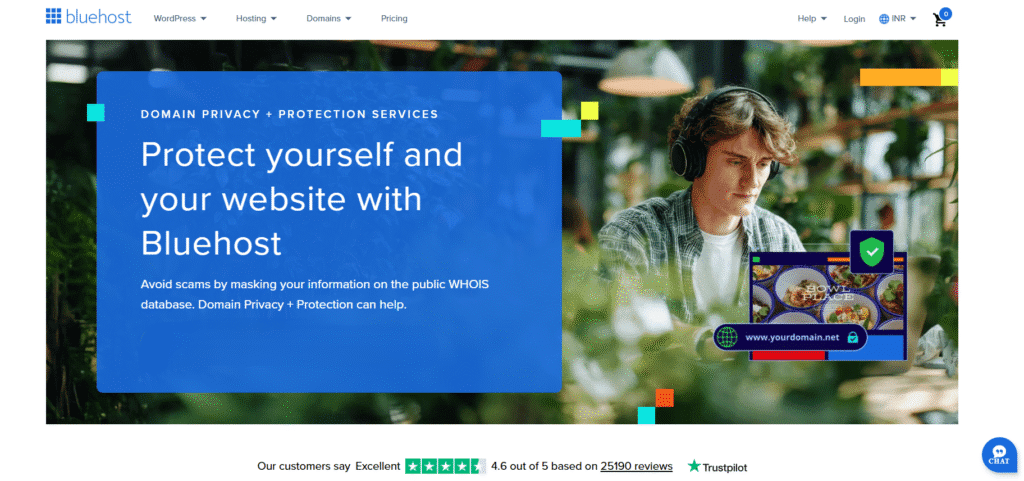
Bluehost Domain Privacy and Protection replaces your details in the WHOIS listing. It keeps your data private while ensuring you still own your domain.
Let’s check out the steps to purchase domain privacy protection and activate it.
How to purchase domain privacy
To activate domain privacy for your domain, you’ll first need to purchase it. Here’s how:
- Log in to your Bluehost Account Manager.
- In the left-side menu, click on the “Domain Name” tab.
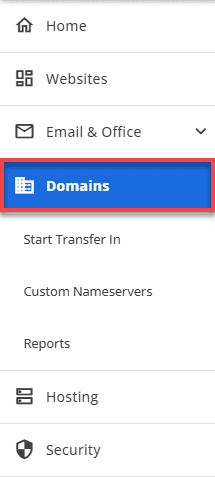
- Select the domain name you want to update.
- In the Domain Overview section, click “Turn on” to activate privacy. Alternatively, scroll down to the “Domain Contacts” section and select “Turn On” under Private Registration.
- Complete the payment to finalize your purchase.
How to enable domain privacy and protection
Domain privacy allows you to mask your personal information in the ICANN directory with general contact details. Here’s how to enable it:
- Log into your Bluehost Account Manager.
- In the left-hand menu, select the “Domain Name” tab.
- Choose the domain you want to update.
- In the Domain Overview section, click “Turn on” to activate privacy.

Alternatively, scroll down to the “Domain Contacts” section. Then, click “Turn On” under Domain Privacy + Protection.
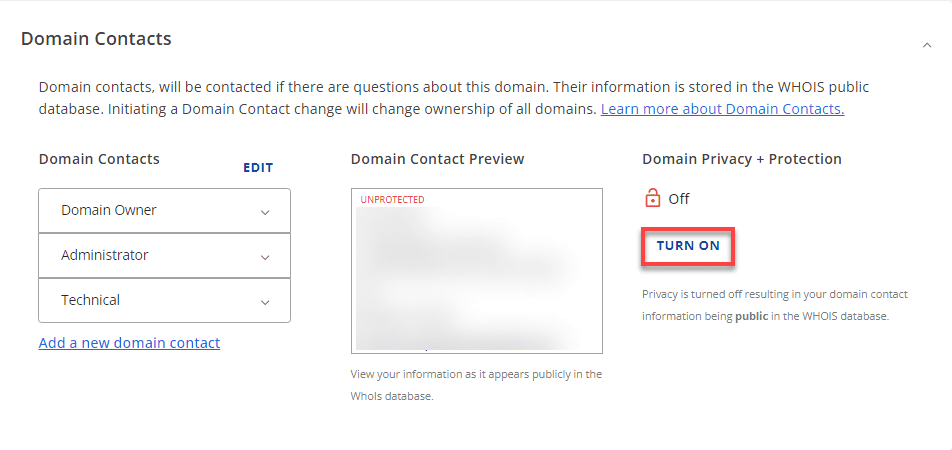
Once completed, your domain privacy is successfully enabled.
Also read: Enable and Disable Domain Privacy and Protection
Quick checklist: How to activate domain privacy on Bluehost
- Log in to your Bluehost Account Manager.
- Open the Domain Name tab from the left menu.
- Select the domain you want to update.
- In the Domain Overview, toggle Domain Privacy + Protection → ON.
- Alternatively, you can go to Domain Contacts and enable Private Registration.
- Complete the payment transaction if required.
- Confirm privacy is active and your WHOIS information should now be hidden.
Final thoughts
Do I Need Domain Name Privacy Protection? For most website owners, the answer is yes. Domain privacy is vital for website owners and business email users. It keeps their personal information out of the public WHOIS directory. Domain privacy protection hides your contact details. It replaces them with anonymous info. It helps shield your sensitive data, like your name and email.
The benefits are many. It includes reducing spam and unwanted traffic. It also protects your identity and lowers hacking, so resuscitating this service is simple. With providers like Bluehost, you can use it when you host your site with them.
We hope this article has clarified the value of domain privacy protection. If you have more questions, check out the FAQs below or leave a comment.
FAQs
Yes. When you register a domain, your personal contact information (name, email, phone, street address) is added to the public Registration Data Directory Services (RDDS), formerly WHOIS. Without a domain privacy protection service, this data can fall into the wrong hands, leading to spam, scam phone calls, or even identity theft. Our domain privacy service hides your details and replaces them with our registrar information, giving you peace of mind and full domain protection.
Absolutely. Without protection, tens of thousands of marketers, bots and even cybercriminals can access your WHOIS records. Our domain privacy protection service prevents this by masking your domain details while keeping your domain status active and compliant with the Internet Corporation for Assigned Names and Numbers (ICANN) rules. For website owners and online stores, it’s one of the easiest ways to safeguard your brand and credibility.
Domain privacy keeps your sensitive information out of public WHOIS directories, but no service can guarantee complete protection. While we protect your domain details and reduce spam, scammers may still find indirect ways to target you. That’s why we recommend pairing domain privacy with strong domain management practices, such as two-factor authentication, secure logins and regular monitoring.
Our domain privacy service replaces your personal domain details in the public WHOIS listing with our generic contact information. This includes:
1. Name and organization
2. Email address
3. Phone number
4. Street address
You remain the legal domain owner, but your identity stays private. This layer of privacy helps protect your information from spam, hackers and misuse by search engines or competitors.
We include free domain privacy for the first year with select hosting and domain plans. After that, it’s an affordable add-on that renews with your domain. Adding privacy to your plan ensures full domain protection and gives you control over how your domain status and ownership information appear online.
It’s simple to turn on our domain privacy protection service:
1. Log in to your Bluehost account.
2. Go to Domain Management and select your domain.
3. In the Domain Overview, toggle on Domain Privacy + Protection.
4. Complete the checkout if needed.
Once activated, your domain details are hidden from public WHOIS directories, helping keep your identity secure and your domain safe.
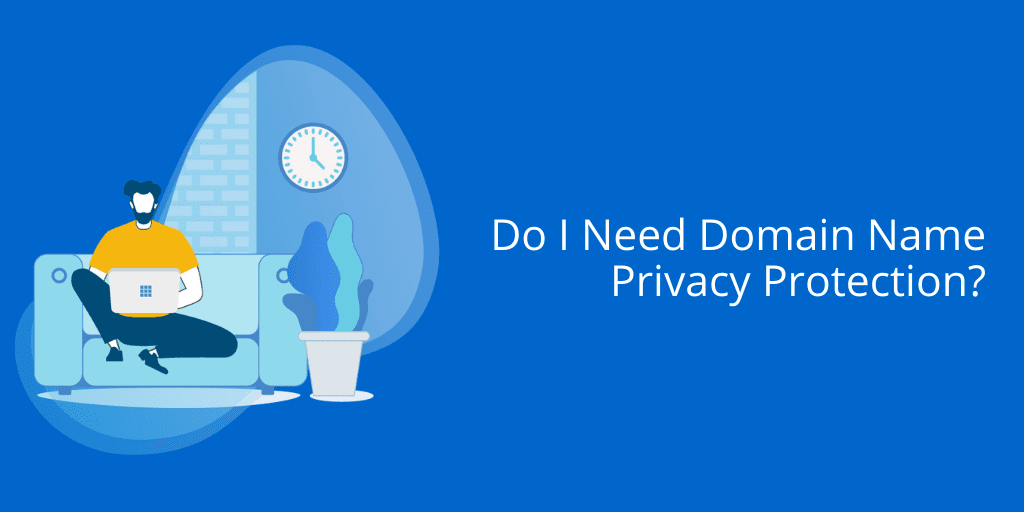
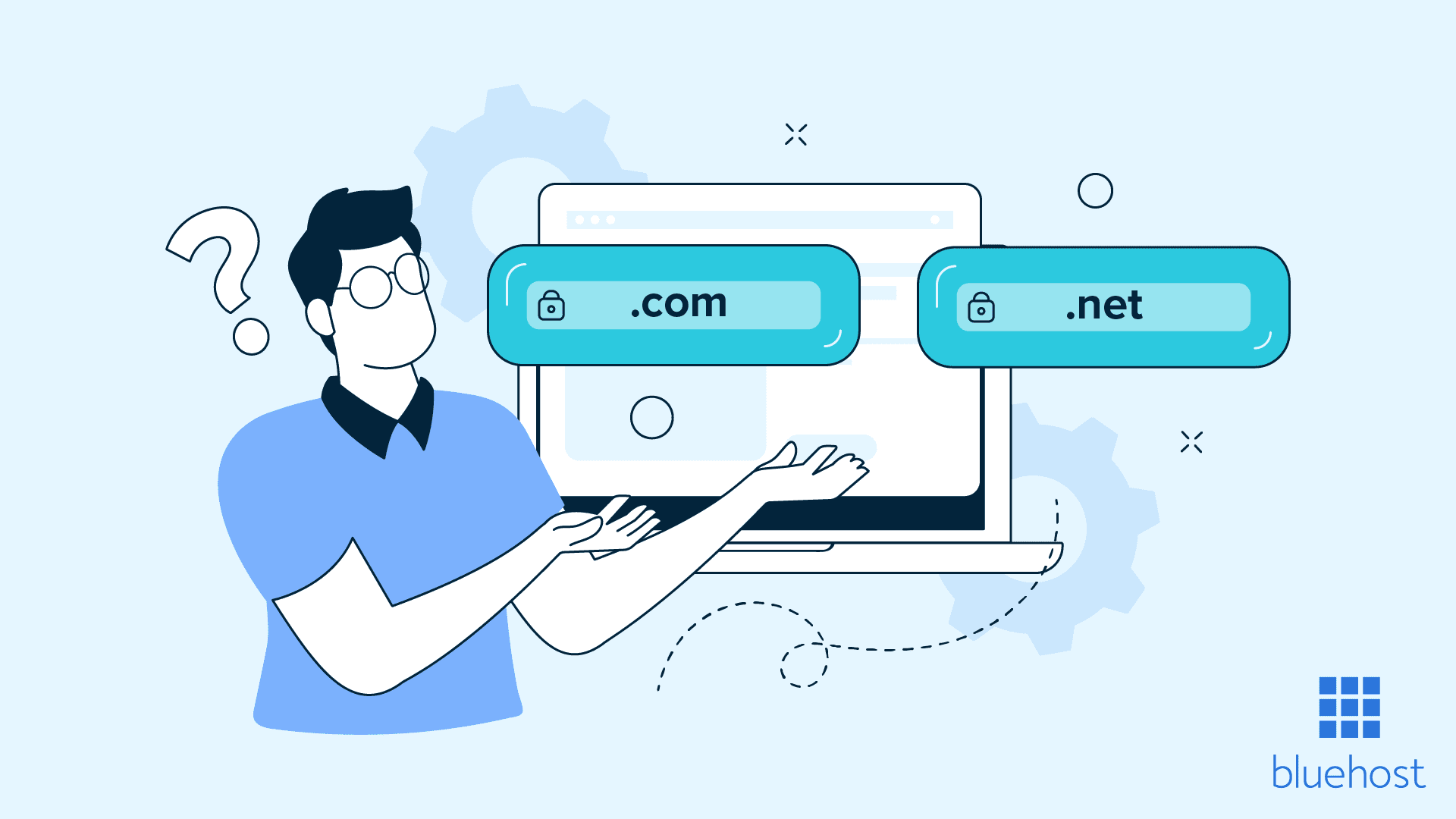

Write A Comment